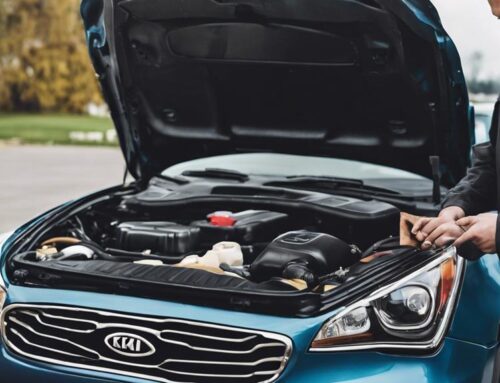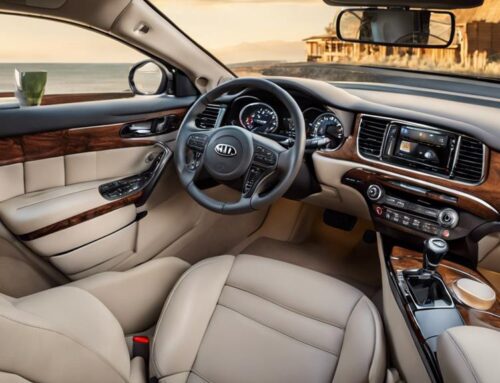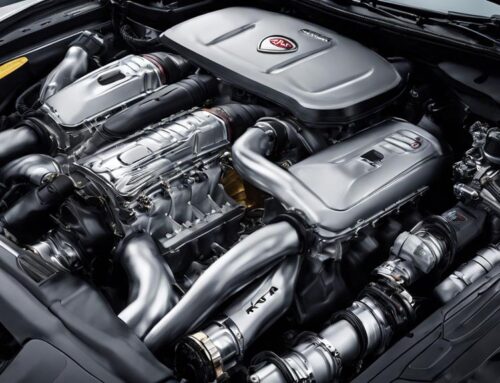Choosing a used Nissan Altima offers a smart blend of reliability, advanced features, and value for savvy buyers. When inspecting, check for rust, dents, and paint issues, and confirm maintenance records are complete. Pay special attention to the engine and continuously variable transmission (CVT) for leaks or abnormal wear. Verify the key fob, immobilizer, and alarm system functions. Be aware of common mechanical issues such as sensor malfunctions and CVT problems. Market trends influence its resale value, so research current prices and negotiate based on identified flaws. If you're curious about mastering these checks and getting the best deal, you're on the right track.
Key Takeaways
- Inspect the exterior for rust, dents, and paint issues to ensure the vehicle's condition.
- Verify key fob functionality and the security system for any vulnerabilities.
- Check maintenance records, engine compartment for leaks, and tire condition.
- Perform a VIN verification to detect any tampering or theft history.
- Research current market values and consider potential mechanical issues for price negotiation.
Introduction to Buying a Used Altima

When you're thinking about purchasing a pre-owned Nissan Altima, you'll want to begin with a strong understanding of what sets this model apart. The Altima has established a reputation for blending reliability with a range of advanced features, making it an attractive choice for those interested in investing in a secondhand vehicle.
First, let's discuss Altima dependability. Nissan has engineered the Altima with a focus on durability and performance, ensuring that even older models maintain their integrity over time. The Altima's sturdy engine choices, including the efficient 2.5-liter inline-4 and the more potent V6, offer a well-rounded combination of fuel efficiency and performance that remains strong under various driving conditions. Additionally, the Altima's transmission system, particularly the Continuously Variable Transmission (CVT), is crafted to provide a smooth and efficient driving experience, contributing to its long-term reliability. Additionally, the Altima comes with several safety features that guarantee both security and peace of mind for drivers and passengers alike.
Now, consider the Altima characteristics. This model is filled with innovative technology that keeps it competitive even as it ages. For example, many used Altimas come equipped with Nissan's Safety Shield 360, a suite of driver-assist technologies that includes automatic emergency braking, blind-spot monitoring, and rear cross-traffic alert. These features not only improve safety but also add significant value to a pre-owned vehicle.
Furthermore, the interior of the Altima is designed with comfort and convenience in mind, offering amenities like advanced infotainment systems, premium seating materials, and ample cabin space.
What to Look for When Buying Used
Purchasing a pre-owned Nissan Altima demands a sharp eye and thorough examination to ensure you secure the best value and performance. Start by scrutinizing the exterior condition of the vehicle. Look for any indications of rust, dents, or paint discrepancies that could suggest previous accidents or subpar repair work. Pay careful attention to the alignment of body panels and the state of the headlights and taillights. Even minor flaws can suggest underlying issues that may not be immediately visible. Be mindful that some typical problems with Nissan Altimas include mechanical and key system failures, which can be expensive to repair.
Next, delve into the maintenance records. A well-documented service history can offer valuable insights into how diligently the previous owner maintained the vehicle. Check for regular oil changes, tire rotations, and other routine maintenance tasks. If the records indicate consistent servicing at recommended intervals, it's a positive indicator that the car has been well-kept. Conversely, gaps in the maintenance records or missing documentation should raise concerns.
Don't forget to inspect the tires. Uneven wear may indicate alignment issues or suspension problems. Confirm that the tread depth is within safe parameters and contemplate whether you'll need to replace the tires soon, as this could increase your overall expenses.
Take the time to assess the engine compartment. Look for any signs of fluid leaks, corrosion, or unusual wear and tear. The engine should operate smoothly without any abnormal noises.
A test drive is essential to evaluate the car's performance. Pay attention to the transmission's responsiveness, braking effectiveness, and any vibrations or noises that could suggest mechanical issues.
Inspecting Key and Security Systems
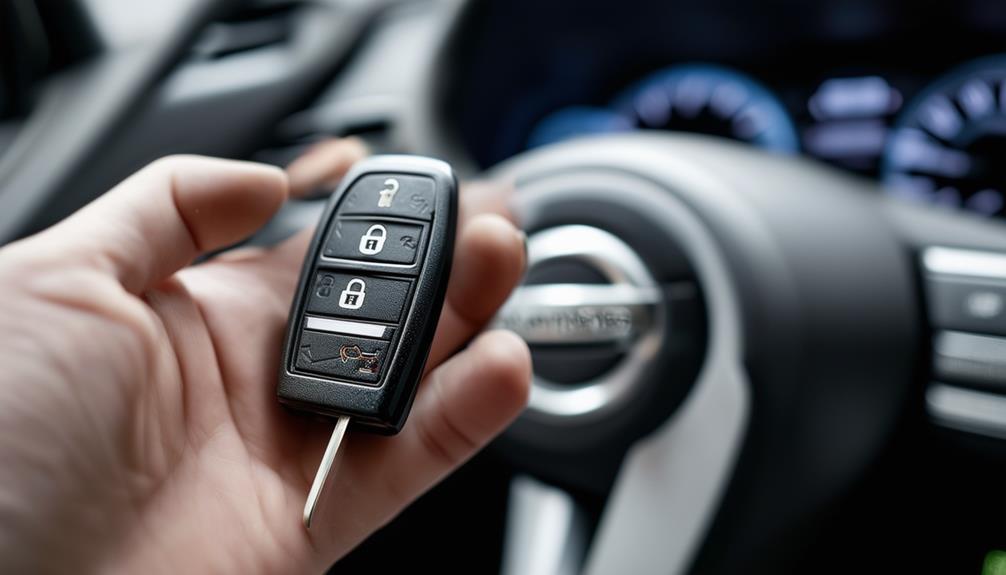
After you've thoroughly examined the vehicle's physical and mechanical condition, it's time to focus on the key and security systems. Ensuring these are in best working order is vital for both convenience and safety. Start by checking the key fob. Verify that it operates all functions, including locking, opening, and remote start if applicable. Malfunctioning key fobs might need reprogramming, which can be costly.
Next, delve into the Altima's security features. Many models come equipped with advanced systems, such as immobilizers and alarm systems. Confirm that the immobilizer activates when the key is removed and deactivates upon insertion. Test the alarm system by triggering it intentionally—open a door or trunk without using the key fob. Listen for the alarm sound and ensure it deactivates with the fob.
Here's a quick reference table to guide your inspection:
| Component | Checkpoints | Notes |
|---|---|---|
| Key Fob | Lock/Unlock, Remote Start | Ensure all functions work; consider reprogramming if necessary |
| Immobilizer | Activation/Deactivation | Verify it works properly to prevent unauthorized use |
| Alarm System | Trigger and Deactivation | Confirm alarm triggers and deactivates correctly |
Security weaknesses can pose significant risks. Research any model-specific vulnerabilities in the Altima you're considering. Some older models might have known flaws that could be exploited. Addressing these weaknesses proactively can save you from potential headaches down the road.
Common Mechanical Issues in Used Models
Owning a used Nissan Altima can come with its share of mechanical challenges, but being aware of common issues can save you time and money. One of the primary concerns with older Altima models is engine reliability. The 2.5-liter 4-cylinder engine, in particular, has been known to suffer from excessive oil consumption. This issue tends to surface as the vehicle accumulates higher mileage, so it's essential to regularly check oil levels and address any leaks. Maintaining consistent oil changes can mitigate some risks, but if you notice a significant drop in oil levels between changes, it might be a sign of deeper issues. For more on keeping your vehicle in top shape, refer to this Ultimate DIY Maintenance Guide.
Another prevalent problem lies with transmission issues, specifically with the Continuously Variable Transmission (CVT) used in many Altima models. While CVTs are praised for their fuel efficiency and smooth operation, they've been a point of contention for reliability. Symptoms of failing CVTs include shuddering, slipping, or even complete transmission failure. If you experience any irregularities while driving, it's advisable to have a professional inspection done. Regular transmission fluid changes can extend the life of the CVT, but if problems persist, you might be looking at a costly repair.
Beyond engine reliability and transmission issues, other common problems include malfunctioning sensors and electrical components.
For instance, the crankshaft position sensor and camshaft position sensor can fail, leading to engine stalling or hard starting conditions. These sensors are essential for optimal engine performance, so replacing them promptly when they fail can prevent further complications.
Understanding Altima Market Values
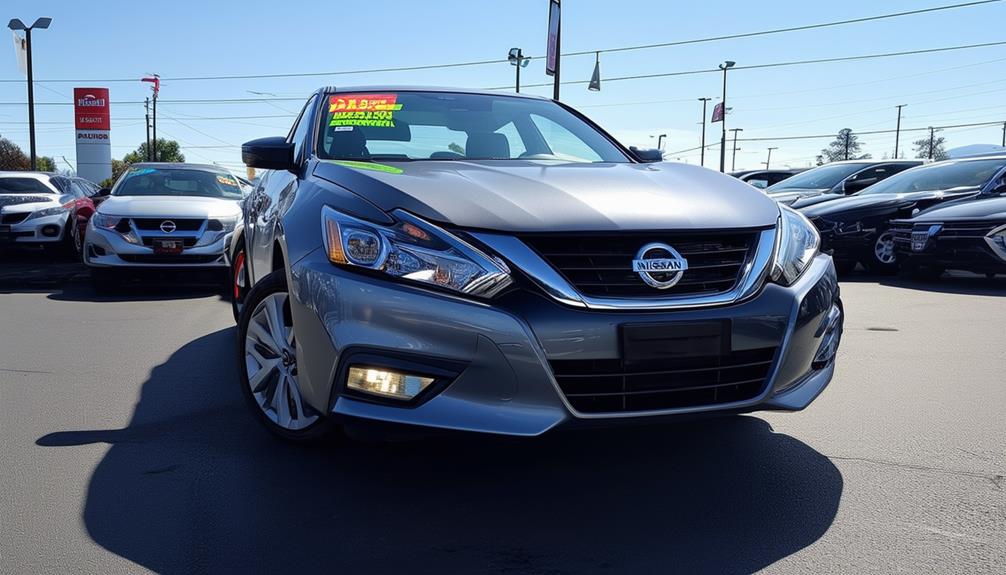
Understanding the market values of used Nissan Altimas can help you make an informed purchase decision, especially given the potential mechanical issues to keep in mind. Start by examining current market trends. The used car market is highly dynamic, influenced by factors such as new model releases, economic conditions, and consumer preferences.
For instance, a recent uptick in the demand for fuel-efficient vehicles can elevate the resale value of an Altima due to its commendable fuel economy. Additionally, staying informed about the evolution of Nissan Altima can give you a better understanding of the technological advancements and design changes that might affect the vehicle's value.
Depreciation is another critical factor to take into account. Like all vehicles, the Nissan Altima experiences depreciation, but the rate can vary significantly depending on the model year, mileage, and overall condition. Typically, a new car loses about 20-30% of its value in the first year and around 15% annually for the next few years. Understanding this depreciation curve will help you gauge whether a particular used Altima is priced fairly.
Altima resale value also depends on specific features and trim levels. Higher trims with advanced technology, safety features, and better aesthetics tend to hold their value longer.
For example, an Altima with a premium sound system, leather seats, and advanced safety features like adaptive cruise control will generally have a higher resale value compared to a base model.
Analyzing these factors not only aids in negotiating a fair price but also provides insight into the long-term value of your investment. By staying abreast of market trends and understanding depreciation, you're better equipped to make a savvy purchase and potentially sell the vehicle at a favorable price in the future.
Pros and Cons of Different Model Years
When evaluating the pros and cons of different Nissan Altima model years, it's important to investigate the specific enhancements and drawbacks that each iteration brings. Each model year offers unique features, performance upgrades, and potential maintenance issues that can impact your driving experience and long-term satisfaction.
Starting with the early 2010s, these models are often praised for their reliability and solid performance. However, they're likely to have higher mileage, which can affect both performance and resale value. Older models may also lack the advanced technology and safety features found in newer versions. You should check the maintenance history to make sure that major components like the transmission and engine have been well cared for.
Moving to the mid-2010s, Nissan introduced several performance upgrades, including more fuel-efficient engines and improved handling. These models generally offer a good balance between modern features and affordability. Yet, they may still have some mileage considerations that could influence their resale value. Look for models with thorough service records to reduce potential future repairs.
The latest models, especially from 2018 onwards, come packed with cutting-edge technology, enhanced safety features, and superior performance upgrades. These cars often have lower mileage and higher resale value, making them attractive options. However, the initial purchase price may be higher. Newer models also come with updated maintenance histories, providing peace of mind regarding potential wear and tear.
Test Driving Tips

Test driving a used Nissan Altima is important to make sure you're making a sound investment. Begin by reviewing the vehicle's maintenance history. A well-documented history indicates the car has been cared for, reducing the risk of unforeseen issues. Look for records of regular oil changes, brake inspections, and any major repairs. This background will give you a baseline for your performance evaluation.
It's also wise to be aware of common issues specific to Nissan Altimas, including mechanical and key system failures, so you know what to look out for.
When you start the car, listen for any unusual noises from the engine. A smooth and quiet start suggests a well-maintained engine. During the drive, pay attention to the transmission's performance. The shifts should be seamless; any jerking or hesitation could signal transmission problems.
Evaluate the Altima's handling by taking it on different road types. Test it on highways to check for stability at higher speeds and local streets to assess maneuverability. Don't forget to test the brakes. They should feel firm and responsive. If you notice any vibrations or hear grinding noises, it might indicate worn-out brake pads or rotors.
Check the alignment by driving on a straight road and briefly letting go of the steering wheel. The car should continue straight without drifting. Misalignment can be a sign of suspension issues or previous accidents.
Inspect the tech features too. Make sure the infotainment system, navigation, and any driver-assistance features are fully functional. Advanced features not only enhance your driving experience but also reflect the car's overall condition.
Negotiating Price and Warranty
Securing a fair price and a reliable warranty for your used Nissan Altima requires a strategic approach. Begin with thorough research. Knowing the market value of the model you're interested in is essential for effective price negotiation. Utilize tools like Kelley Blue Book or Edmunds to get a clear picture of current pricing trends. Armed with this knowledge, you can confidently counter any inflated offers.
Additionally, consider the Nissan Altima generations to understand the unique features and common issues of each model year.
When negotiating, emphasize any flaws or maintenance issues you discovered during the test drive. This can justify a lower price. Certified preowned vehicles often come with manufacturer warranty options that provide peace of mind. However, these vehicles may carry a premium price. Weigh the cost against the benefits of having a warranty backed by Nissan.
Don't overlook extended warranty options. While they add to the upfront cost, they can save you significant money on unexpected repairs down the line. Evaluate the coverage details meticulously. What components are included? Are there any exclusions? Make sure the extended warranty covers major systems that are costly to repair, such as the engine and transmission.
It's also wise to compare different warranty providers. Some third-party warranties offer comparable coverage at a lower cost than manufacturer warranty options. However, make certain that the provider has a good reputation for honoring claims.
Identifying Tampered or Stolen Altimas
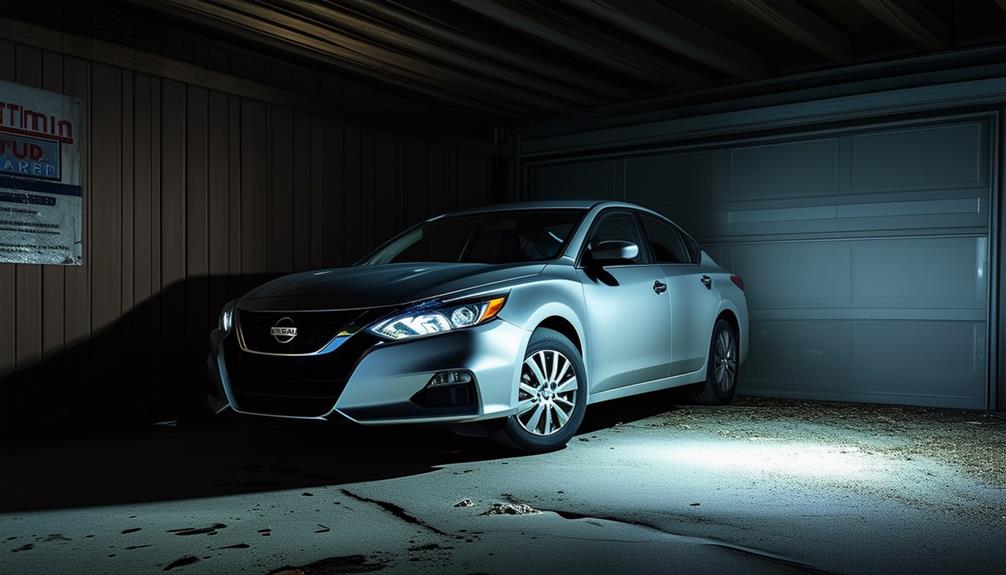
How can you confirm that the used Nissan Altima you're eyeing hasn't been tampered with or stolen? First, perform a thorough VIN verification. The Vehicle Identification Number (VIN) is a unique code for every car. Check that the VIN on the dashboard matches the one on the door frame and other critical locations. Discrepancies can be a red flag for tampering or theft. Use online databases to conduct a theft check, ensuring the vehicle hasn't been reported stolen.
Next, look for signs of tampering. Scrutinize the car's locks, ignition, and windows. Tampering often leaves subtle clues like scratches around the locks or ignition switch. Inspect the screws and bolts; they should all match and show consistent wear. Uneven wear can indicate parts have been replaced or tampered with. For additional insights, consider the car's key and security systems.
Pay attention to aftermarket modifications. While some modifications are benign, many can mask underlying issues. Aftermarket parts like new stereo systems or custom lighting can sometimes be used to cover up damage or illegal modifications. Verify that any modifications have been installed correctly and check if they comply with local regulations.
Best Places to Find a Used Altima
After ensuring the used Nissan Altima hasn't been tampered with or stolen, the next step is finding reputable sources to purchase one. Navigating the marketplace for a used Altima can be overwhelming, but focusing on trustworthy sources will streamline your search and guarantee you get a vehicle that meets your standards. Notably, with the anticipated progress in key and security systems in newer models, it's crucial to consider the technological features of the used Altima you're eyeing.
1. Trustworthy Dealerships:
Start with established dealerships known for their transparent practices and certified pre-owned programs. These dealerships often provide thorough inspections, warranties, and detailed vehicle histories, giving you peace of mind. When choosing a dealership, look for those with strong customer reviews and official accreditation, such as Nissan-certified dealerships.
2. Online Listings:
The digital era provides a plethora of online platforms where you can find used Altimas. Websites like Autotrader, Cars.com, and even the Nissan USA certified pre-owned portal offer extensive listings. These platforms allow you to filter searches by year, mileage, price, and location, which makes it easier to find a vehicle that matches your criteria. Always verify the legitimacy of online sellers by checking reviews and ratings and, if possible, arranging a pre-purchase inspection.
3. Private Sellers:
While riskier, buying from private sellers can yield good deals if approached with caution. Platforms like Craigslist and Facebook Marketplace are popular for private listings. Ensure you get a vehicle history report and, if possible, have a mechanic inspect the car before completing the purchase.
Utilizing these sources can notably increase your chances of finding a high-quality used Nissan Altima. By leveraging trustworthy dealerships, online listings, and vetted private sellers, you position yourself to make an informed, confident purchase.
Frequently Asked Questions
How Does Insurance Cost Vary for Different Model Years?
Insurance costs vary for different model years based on factors like depreciation rates and warranty coverage. Newer models might have higher premiums due to their value, while older ones could be cheaper but lack extensive warranty benefits.
Are There Any Specific Recalls for Certain Altima Models?
Think of recall information as the lighthouse guiding you through the fog of used car purchases. For Altima models, common issues include transmission failures and airbag defects. Check specific recalls for the model year you're considering.
What Are the Maintenance Costs for a Used Nissan Altima?
You'll find maintenance costs for a used Nissan Altima vary, but when you do a cost comparison, they're generally moderate. With high reliability ratings, you'll likely save on repairs, making it a smart, innovative choice.
Can I Upgrade the Infotainment System in Older Altima Models?
Yes, you can upgrade the infotainment system in older Altima models. Aftermarket upgrades offer compatibility and a straightforward installation process. You'll find cost-effective options that enhance functionality, providing an innovative and modern driving experience.
How Fuel-Efficient Are Older Nissan Altima Models?
Older Altima models are generally fuel-efficient, but mileage varies by year and engine type. You'll find reliability ratings helpful. Performance upgrades can improve efficiency, but weigh the costs. Innovative tech in newer models might offer better value.
Conclusion
To sum up, purchasing a pre-owned Nissan Altima can be a fantastic choice if you stay alert and attentive. Think of it as exploring a treasure map; with the right inspection and market knowledge, you'll discover a gem. Keep an eye on essential security features, typical mechanical problems, and market prices. Don't overlook the test drive, and negotiate wisely. For great offers, check out reputable dealerships and trusted online platforms. Happy hunting!


